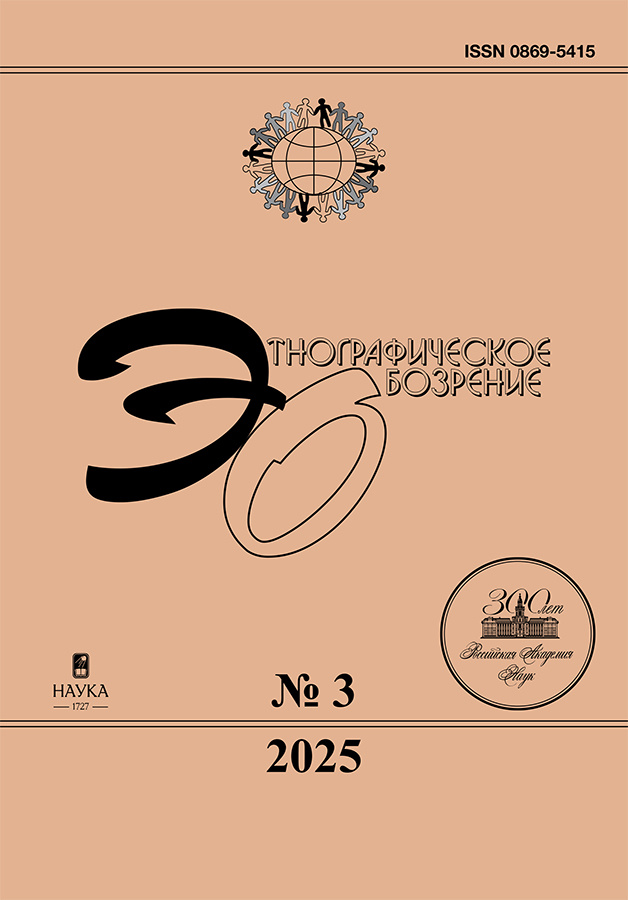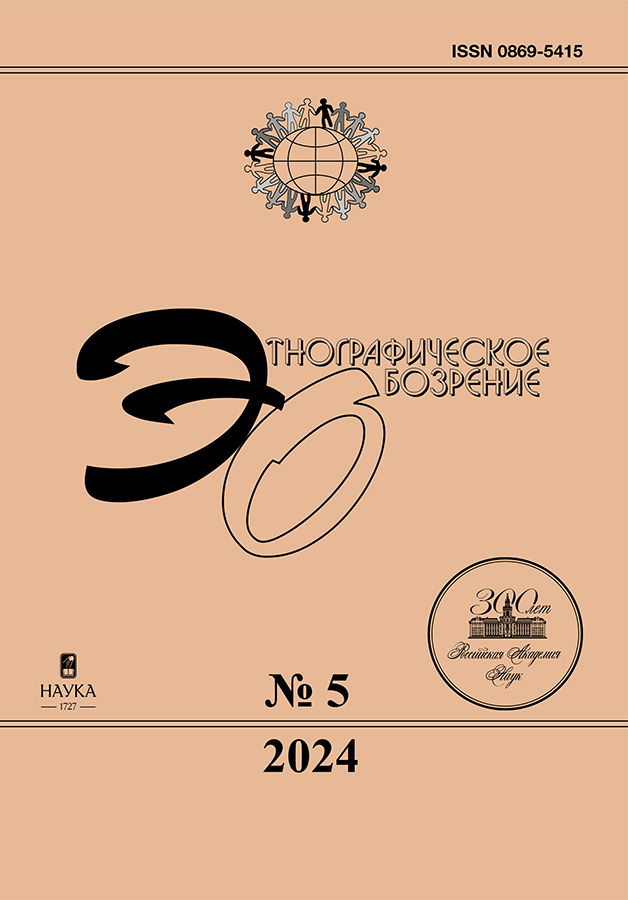Children’s Agency in Migration Strategies and Integration Scenarios
- Authors: Garipova L.1
-
Affiliations:
- Federal Center of Theoretical and Applied Sociology, Russian Academy of Sciences
- Issue: No 5 (2024)
- Pages: 111-135
- Section: Migration Studies
- URL: https://cijournal.ru/0869-5415/article/view/672418
- DOI: https://doi.org/10.31857/S0869541524050071
- EDN: https://elibrary.ru/ASBLAU
- ID: 672418
Cite item
Abstract
The article presents case studies examining various forms of children’s agency in migrant’s strategies and migration scenarios. Drawn on interviews and field research among migrant families in a large Russian city, it is thematically split into two parts. The first discusses the role of children in making decisions on the country of residence and education in the context of family migration. Here, a number of cases are taken to demonstrate how obstacles to education access influence children’s agency and how the latter gets embedded in family responsibilities. The second part specifically addresses a practice of acquiring a “Russian” name, that is the practice of engaging children in Russian-speaking communities that may be observed in the educational milieu.
Full Text
About the authors
Leisan Garipova
Federal Center of Theoretical and Applied Sociology, Russian Academy of Sciences
Author for correspondence.
Email: lgaripova@eu.spb.ru
ORCID iD: 0009-0002-0614-7014
младший научный сотрудник
Russian Federation, 24/35, bldg 5, Krzhizhanovskogo St., Moscow, 117218References
- Abashin, S.N. 2015. Vozvrashchenie domoi: semeinye i migratsionnye strategii v Uzbekistane [Returning Home: Family and Migration Strategies in Uzbekistan]. Ab Imperio 3: 125–165.
- Abashin, S.N. 2012. Sredneaziatskaia migratsiia: praktiki, lokal’nye soobshchestva, transnatsionalizm [Central Asian Migration: Practices, Local Communities, Transnationalism]. Etnograficheskoe obozrenie 4: 3–13.
- Akifyeva, R.N. 2015. Deti i roditeli-migranty v Sankt-Peterburge: nesoglasovannye linii povedeniia [Children and Their Migrant Parents in St. Petersburg: Divergent Lines of Behavior]. Etnograficheskoe obozrenie 5: 117–134.
- Aleksandrov, D.A., et al. 2012. Polozhenie detei migrantov v Sankt-Peterburge [The Status of Migrant Children in St. Petersburg]. Moscow: Detskii fond OON (YuNISEF).
- Aleksandrov, D.A., et al. 2012. Deti i roditeli-migranty vo vzaimodeistvii s rossiiskoi shkoloi [Migrant Children and Parents in Interaction with Russian Schools]. Voprosy obrazovaniia 1: 176–199.
- Baranova, V.V. 2012. Yazykovaia sotsializatsiia detei migrantov [Language Acquisition of Migrant Children]. Antropologicheskii forum 17: 157–172.
- Borisova, E.V. 2016. Roditel’stvo na rasstoianii: transnatsional’nye praktiki v sem’iakh migrantov iz Tadzhikistana [Parenting at a Distance: Transnational Practices in Migrant Families from Tajikistan]. Antropologicheskii forum 28: 228–245.
- Borisova, E.V. 2017. Detskaia mobil’nost’ v kontekste migratsii iz Tadzhikistana [Child Mobility and Transnational Imagination in the Context of Migration from Tajikistan]. Sotsiologicheskie issledovaniia 8: 73–80. https://doi.org/10.7868/S0132162517080086
- Borisova, E.V. 2017. “Ne stala zdorovat’sia – vot chto znachit ezdit’ v Rossiiu!”: vozvrashcheniie detei migrantov kak predmet moral’nykh suzhdenii v Tadzhikistane [“She no Longer Greets Us – That’s What Going to Russia Means”: The Return of Migrant Children as an Object of Moral Judgment in Tajikistan]. Etnografi cheskoe obozrenie 3: 16–31.
- Brednikova, O., and M. Kaeser. 2004. Transnatsionalizm i translokal’nost’ (kommentarii k terminologii) [Transnationalism and Translocality (Comments on Terminology)]. In Migracia i nacional’noe gosudarstvo [Migration and Nation State], edited by T. Baraulina and O. Karpenko, 133–146. St. Petersburg: TsNSI.
- Brednikova, O.E., and G.A. Sabirova. 2015. Deti v migrantskikh sem’iakh: roditel’skie strategii v transnatsional’nykh kontekstakh [Children in Migrant Families: Parenting Strategies in Transnational Contexts]. Antropologicheskii forum 26: 127–152.
- Byford, A., et al. 2019. Forum: V poiskakh detskoi sub’ektnosti [Forum: Children as Subjects]. Antropologicheskii forum 42: 9–106.
- Varshaver, E.A., A.L. Rocheva, and N.S. Ivanova. 2019. Integratsiia migrantov vtorogo pokoleniia v vozraste 18–35 let v Rossii: rezul’taty issledovatel’skogo proekta [Second Generation Migrants Aged 18–35 in Russia: Research Project Results]. Monitoring obshchestvennogo mneniia: ekonomicheskie i sotsial’nye peremeny 2 (150): С. 318–364. https://doi.org/10.14515/monitoring.2019.2.15
- Kozlovskaya, A.Y, and A.V. Kozlova. 2020. Detskaia agentnost’ kak predmet teoreticheskoi diskussii i prakticheskaia problema (antropologicheskii kommentarii) [Children’s Agency as a Theoretical Problem and a Practical Concern (an Anthropological Remark)]. Antropologicheskii forum 45: 11–25. https://doi.org/ 10.31250/1815–8870–2020–16–45–11–25
- Liarskaia, E.V. 2006. “U nikh zhe vse ne kak u liudei…”: nekotorye stereotipnye predstavleniia pedagogov Iamalo-Nenetskogo okruga o tundrovikakh [“They Are Not Like Other People…”: Some Stereotypes of Teachers from the Yamalo-Nenets Autonomous Okrug about Tundra People]. Antropologicheskii forum 5: 242–258.
- Panova, E.A., and K.S. Fedorova. 2006. Inoetnichnye deti v peterburgskoi shkole: mify i real’nost’ (po materialam sotsiolingvisticheskogo issledovaniia) [Ethnic Minorities Children in St. Petersburg School: Myths and Reality (Based on Sociolinguistic Research)]. Zhurnal issledovanii sotsial’noi politiki 4 (1): 81–102.
- Peshkova, V.M. 2021. Transnatsional’noe detstvo. Chast’ I: postanovka voprosa i obzor osnovnykh teoretiko-metodologicheskikh podkhodov [Transnational Childhood, Part I: The Review of Theoretical Approaches and Formulation of the Research Question]. Monitoring obshchestvennogo mneniia: ekonomicheskie i sotsial’nye peremeny 4: 451–467. https://doi.org/10.14515/monitoring.2021.4.1803
- Sabirova, G.A. 2017. “Vozvrashcheniie posle vozvrashcheniia”: povtornaia trudovaia migratsiia v Rossiiu [“Return after Return”: Repeated Labor Migration to Russia]. Etnograficheskoe obozrenie 3: 63–75.
- Sabirova, G.A., and Y.V. Andreeva. 2014. Shkol’naia druzheskaia kompaniia podrostka s migratsionnoi istoriei [School Group of Friends of a Teenager’s with a Migration Background]. Zhurnal sotsiologii i sotsial’noi antropologii 17 (1): 170–189.
- Bakewell, O. 2010. Some Reflections on Structure and Agency in Migration Theory. Journal of Ethnic and Migration Studies 36 (10): 1689–1708. https://doi.org/10.1080/ 1369183X.2010.489382
- Demintseva, E. 2020. “Migrant Schools” and the “Children of Migrants”: Constructing Boundaries Around and Inside School Space. Race Ethnicity and Education 23 (4): 598–612. https://doi.org/10.1080/13613324.2018.1538126
- Guo, K., and C. Dalli. 2016. Belonging as a Force of Agency: An Exploration of Immigrant Children’s Everyday Life in Early Childhood Settings. Global Studies of Childhood 6 (3): 254–267. https://doi.org/10.1177/2043610616665036
- Maksutova, A. 2019. Children of Post-Soviet Transnationalism: Integration Potential of Labour Migrants from Central Asia in Russia. Münster: LIT Verlag.
- Orellana, M.F. 2003. Responsibilities of Children in Latino Immigrant Homes. New Directions for Youth Development 2003 (100): 25–39. https://doi.org/10.1002/yd.61
- Orellana M.F., B. Thorne, A. Chee, and W.S.E. Lam. 2001. Transnational Childhoods: The Participation of Children in Processes of Family Migration. Social Problems 48 (4): 572–591. https://doi.org/10.1525/sp.2001.48.4.572
- Orgocka, A. 2012. Vulnerable yet Agentic: Independent Child Migrants and Opportunity Structures. New Directions for Child and Adolescent Development 136: 1–11. https://doi.org/10.1002/cad.20007
- Portes, A., and M. Zhou. 1993. The New Second Generation: Segmented Assimilation and Its Variants. The Annals of the American Academy of Political and Social Science 530 (1): 74–96. https://doi.org/10.1177/0002716293530001006
- Revis, M. 2019. A Bourdieusian Perspective on Child Agency in Family Language Policy. International Journal of Bilingual Education and Bilingualism 22 (2): 177–191. https://doi.org/10.1080/13670050.2016.1239691
- Thompson, A., et al. 2021. Re-conceptualising Agency in Migrant Children from Central America and Mexico. In Undocumented and Unaccompanied: Children of Migration in the European Union and the United States, edited by C. Menjívar and K.M. Perreira, 39–56. London: Routledge.
- White A., C. Ní Laoire, N. Tyrrell, and F. Carpena-Méndez. 2011. Children’s Roles in Transnational Migration. Journal of Ethnic and Migration Studies 37 (8): 1159–1170. https://doi.org/10.1080/1369183x.2011.590635
Supplementary files











